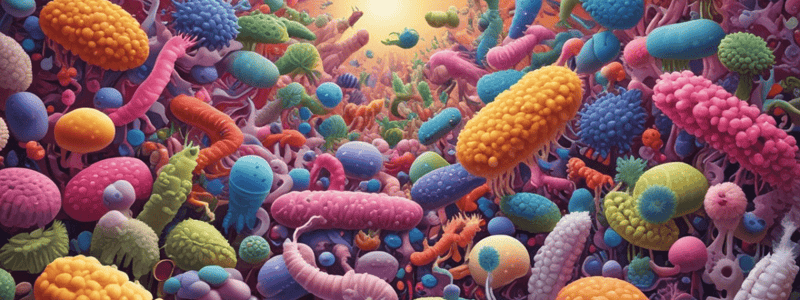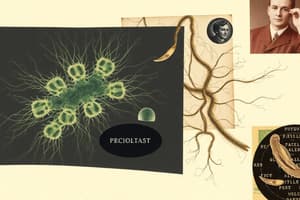Podcast
Questions and Answers
What is the approximate evolutionary age of the phylum Bacteroidetes?
What is the approximate evolutionary age of the phylum Bacteroidetes?
- $200$ million years
- $320$ million years (correct)
- $100$ million years
- $500$ million years
Which of the following statements about Bacteroides is true?
Which of the following statements about Bacteroides is true?
- There are only a few identified species within the Bacteroides genus
- Bacteroides species play vital roles in supporting gut commensals (correct)
- Bacteroides is one of the least abundant genera of bacteria on Earth
- All species of Bacteroides are beneficial to human health
How did the early ancestors of Bacteroides establish themselves in eukaryotic hosts?
How did the early ancestors of Bacteroides establish themselves in eukaryotic hosts?
- They were artificially introduced into eukaryotic hosts as probiotics
- They evolved from free-living soil bacteria and established mutualistic relationships with other organisms (correct)
- They were introduced into eukaryotic hosts through genetic engineering
- They were transferred from one eukaryotic host to another through horizontal gene transfer
Which of the following is NOT one of the four major clusters within the Bacteroides phylogenetic tree?
Which of the following is NOT one of the four major clusters within the Bacteroides phylogenetic tree?
What is the significance of the diversity among Bacteroides species?
What is the significance of the diversity among Bacteroides species?
What is the genus name of the bacteria discussed in the text?
What is the genus name of the bacteria discussed in the text?
What is one of the significant contributions of Bacteroides species to the gut microbiome?
What is one of the significant contributions of Bacteroides species to the gut microbiome?
How do Bacteroides species help in maintaining gut barrier function?
How do Bacteroides species help in maintaining gut barrier function?
What is one role of Bacteroides species in preventing gut-related diseases?
What is one role of Bacteroides species in preventing gut-related diseases?
How do Bacteroides species contribute to energy production in the host?
How do Bacteroides species contribute to energy production in the host?
What happens if the balance of beneficial bacteria in the gut is disrupted?
What happens if the balance of beneficial bacteria in the gut is disrupted?
How do Bacteroides species contribute to reducing inflammation in the gut?
How do Bacteroides species contribute to reducing inflammation in the gut?
Flashcards are hidden until you start studying
Study Notes
Bacteroides - An Important Part of the Gut Microbiome
Bacterioides is one of the most abundant genera of bacteria on Earth, with over 100 species identified within this genus alone. While we often hear about the importance of gut bacteria for our health, it is worth noting that some of the most important ones may not necessarily be beneficial for us directly but instead play vital roles in supporting gut commensals. These diverse bacterial groups help shape our microbiomes by influencing host-microbe symbiosis and affecting various aspects of human physiology.
Let's take a closer look at what makes Bacterioides so significant:
Evolutionary History
The phylum Bacterioidetes has been studied extensively and is known to have evolved from free-living soil bacteria approximately 320 million years ago. It is believed that these early ancestors established mutualistic relationships with other organisms, such as insects, which allowed them to become more intimately associated with their hosts over time. Eventually, this led to the formation of the gut microbiota in eukaryotes like humans.
Diversity of Species
There are four major clusters within the Bacterioides phylogenetic tree, showing that there is a high level of diversity among the different species of Bacterioides:
- Bacteroides ovatus
- Bacteroides fragilis
- Bacteroides uniformis
- Bacteroides vulgatus
Each of these species plays a unique role in maintaining a balanced gut microbiome. For example, studies have shown that Bacteroides ovatus can reduce inflammation in the gut.
Impacts on Host Physiology
Researchers have found that a healthy gut microbiome is essential for digestion, nutrient uptake, immune system function, and metabolic regulation in mammals. Certain Bacterioides species contribute to these processes by breaking down complex carbohydrates, producing short-chain fatty acids (SCFAs), and regulating the anti-inflammatory response. Without these microbes, our bodies would struggle to maintain optimal health.
Metabolism and Energy Production
One of the most significant contributions of Bacterioides species to the gut microbiome is their ability to break down complex carbohydrates that humans cannot digest. By doing so, these bacteria produce SCFAs, such as acetate, propionate, and butyrate. These compounds serve as a source of energy for the host and play an essential role in maintaining the gut barrier function.
Role in Gut Inflammation
Bacterioides species have been shown to regulate inflammation in the gut, which is crucial for maintaining healthy gut function. They do this by producing anti-inflammatory molecules that can reduce inflammation and promote the growth of other beneficial bacteria. This process is essential for maintaining a healthy gut microbiome and preventing gut-related diseases.
The Importance of Bacteroides in Human Health
Understanding the role of Bacterioides in our gut microbiome is essential for developing strategies to maintain a healthy gut and prevent or treat gut-related diseases. Factors such as diet, stress, and the use of antibiotics can disrupt the balance of beneficial bacteria in the gut, leading to conditions like irritable bowel syndrome (IBS), inflammatory bowel disease (IBD), and obesity. By studying Bacterioides and its interactions with other gut bacteria, researchers can identify new approaches to support gut health and prevent these conditions.
In conclusion, Bacterioides is an essential part of the gut microbiome, contributing significantly to our overall health through various processes such as carbohydrate digestion, energy production, and inflammation regulation. Understanding the role of these microbes is crucial for maintaining a healthy gut and preventing gut-related diseases.
Studying That Suits You
Use AI to generate personalized quizzes and flashcards to suit your learning preferences.




